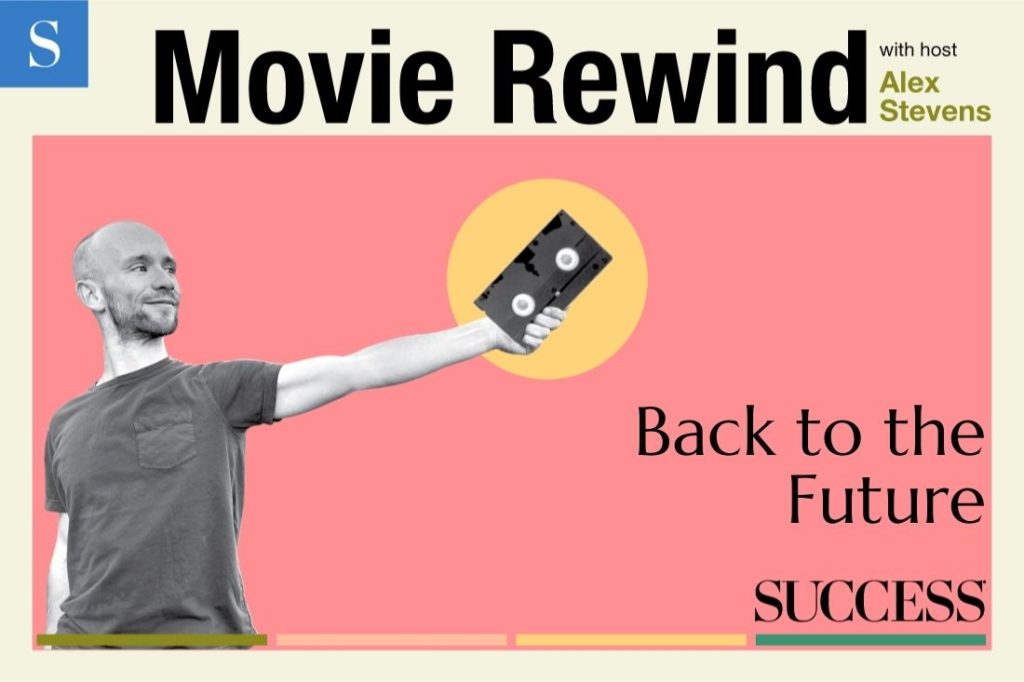It’s not everyone’s favorite Michael J. Fox film (mine is Teen Wolf, but this one’s a close second), but it’s been a fan favorite for millions of people for decades. I’m talking about Back to the Future, the film we’re going to parse in search of tasty bits of personal development wisdom today.
Welcome back to SUCCESS Movie Rewind, where I take you on a journey through a movie to find the lessons we can all use to further our goals. The journey is sometimes a reflective walk down a paved path and sometimes an off-road crash course through the underbrush of pop culture, but it’s always spoiler free within reason and a ton of fun.
Let’s get right to it. What can we learn from a film that hails from the time of the ancients (1985)? As it turns out, a lot.
Lesson 1: No roads doesn’t mean no responsibility
Back to the Future has plenty of memorable quotes, but one of the most memorable lines comes right at the end of the film. Doc Brown says to Marty McFly: “Roads? Where we’re going, we don’t need roads.”
That’s an easy line to love, but I think it’s extra special because it sparked my first major takeaway from this movie. To be an entrepreneur, start a business or really just make your life better in some way, you have to chart your own course. In other words, you’re going somewhere where there won’t be roads, but no roads doesn’t mean no responsibility.
Your responsibility is that of a literal trailblazer. Whether you intend for them to or not, other people may follow the course you are setting, the path you’re paving. You have to make sure that the path is responsible and somehow providing value or usefulness to the world. It can’t just be a new path for newness’ sake.
Keep in mind, too, that the path you envision and the path you ultimately take do not have to be the same, nor do they have to be linear. This movie is all about travel, of course, and moving yourself forward toward your goals is a form of travel. It’s something motivated by desire—main characters in movies and you in your own life will always want something—but does that mean you should take the most direct path to it?
In some cases, it might mean that, but not always. I came across an interesting concept online the other day: the concept of the “desire path.” If you look out across the quad at any college campus, you can see the desire path in physical form. These are the paths that people have worn into the grass because they are shorter or somehow more desirable than the paved pathways. In transportation planning, this is called a desire line.
That departure has gotten us a little bit off the path here, but the main point is that you have to forge a path. It doesn’t have to be the perfect path (the desire path), but it has to be a new path. Make no mistake—if you’re thinking about it and there aren’t any paths there yet, there will be soon. It should be you who forges them.
Lesson 2: When things start to feel heavy, it’s probably your baggage
Film buffs may squirm when they hear me say this, but Back to the Future is like a Stanley Kubrick film. What I mean by that is that it’s packed with symbolism, from the dialogue to the background scenery.
One interesting moment that exemplifies what I’m talking about here occurs when the characters start using the word “heavy” a lot. It comes up a few times, and Doc Brown says: “There’s that word again. Heavy. Why are things so heavy in the future? Is there a problem with the Earth’s gravitational pull?”
In a literal sense, we’re watching Marty and Doc Brown notice that something is up. They’re noticing what friend of the podcast Carl Jung would call “synchronicities”—those little statistically meaningless occurrences that stick out to you because of something specific to your experience or point of view. In other words, when you’re noticing something repeatedly or feeling like certain events in your life are pointing you toward what is starting to feel like an inevitable conclusion, you’re experiencing a synchronicity.
What do you do with that when it happens on your journey to becoming an entrepreneur or otherwise moving your life forward? It’s up to you, but it’s important to understand that your baggage—your unique experiences—are playing a role in you noticing the synchronicity that feels divinely ordained. The call is coming from inside the house—not the heavens. That may give you double the reason to listen to it, or it may give you pause. But it’s an important juncture at which to reflect on your journey so far before making any new decisions.
Lesson 3: Feedback is always some sort of communication.
Let’s talk about that big moment: When Marty McFly is playing guitar and really rocking out at the prom. The journey to that moment involves dealing with a fear of failure—a fear of bad feedback. Unfortunately, and without spoiling too much of the movie, the feedback he gets at this moment isn’t positive.
Here’s the takeaway from that moment: Feedback is always some sort of communication. However, feedback may be about your performance or the audience’s own experience, and it’s up to you to figure out which it is and make changes based on that deduction.
In this case, which involves time travel, the audience had never heard the types of sounds that were coming out of Marty’s amplifier. Fast forward to Marty’s present day, and his performance might’ve been a hit. But on that fateful day in the movie, it isn’t. It’s about the audience in this case.
That may be true for you the first time you seek or otherwise receive feedback about your performance, whether that’s a creative work or a product or service you’re selling. In any case, you have to see that feedback for what it is: communication. Understand it, take what you can from it and move forward.
‘The Devil Wears Prada’ is up next.
There’s plenty more to discuss in Back to the Future, but since we’re talking about time, I won’t take up any more of yours today. Those were the high points, but it’s probably worth giving this one another watch to see what you take from it in the present day.
Next up for SUCCESS Movie Rewind is The Devil Wears Prada, which will be devilishly fun to dissect with you all. And after that, we’ve got the big Dune discussion, so stay tuned. See you next week.











